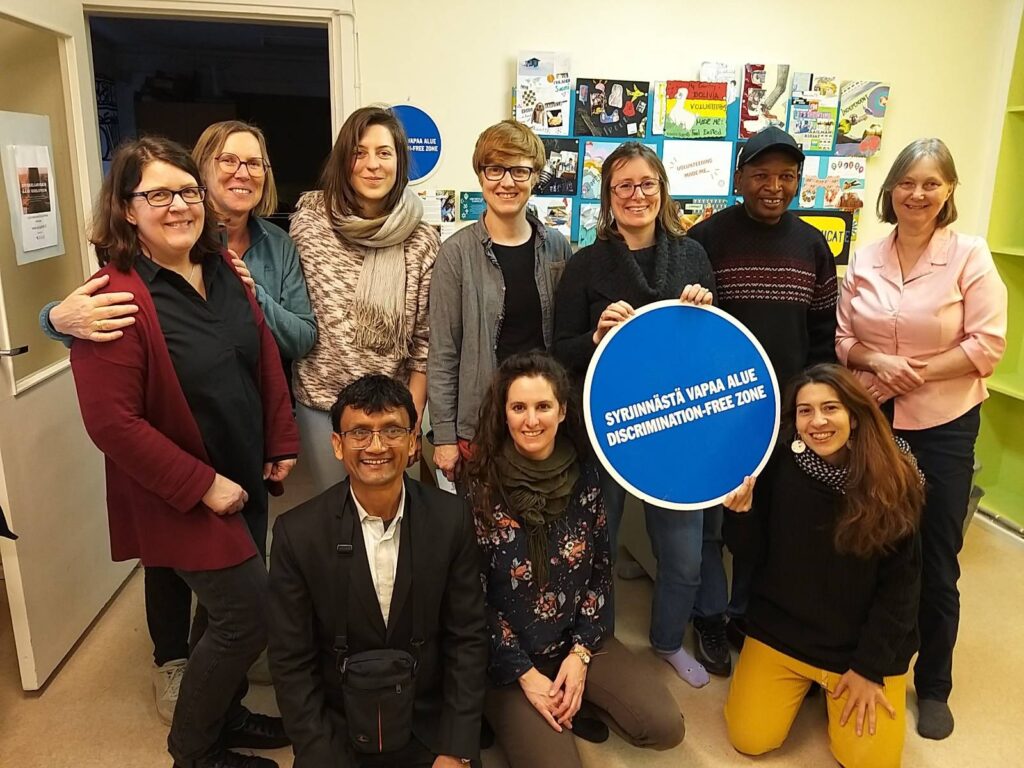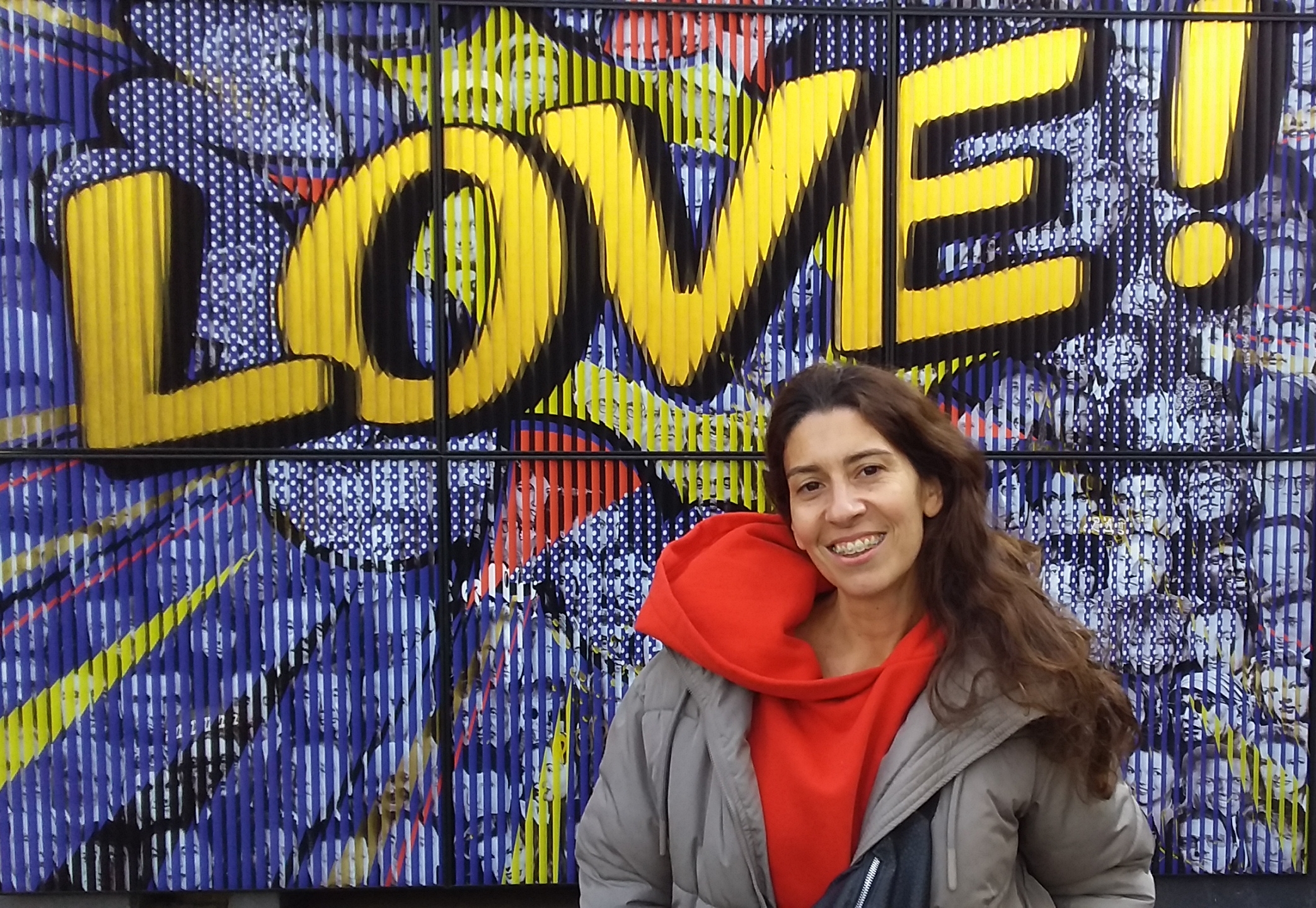
Teams
Decolonise Steering Committee (DSC)

The Decolonise Steering Committee meets monthly online to follow up on the project’s progress and to plan the upcoming activities. The DSC is composed of one representative from each participating organisation and CCIVS and ICYE are coordinating this team.
Besides regular online meetings, the Decolonise Steering Committee also meets in situ to exchange on the challenges encountered and to discuss the work plan in more detail. Each meeting is hosted by a consortium member.
The first DSC meeting took place in Berlin, Germany and was hosted by ICYE. The meeting ended with a decolonial tour in Berlin which was very symbolic as one of the participants reminded us that the Berlin Conference of, also known as the Congo Conference or West Africa Conference, concluded on 26 February 1885, with the signature of a General Act, regulating the European colonisation and trade in Africa during the New Imperialism period.
The DSC met for the second time on 28 March – 1 April 2023 in Helsinki, Finland, hosted by Maailmanvaihto – ICYE Finland. The meeting included an insight into local realities in Finland as a guest speaker from the secretariat of the Truth and Reconciliation Commission Concerning the Sámi People shared some of the discrimination and rights violations the indigenous Sámi people have historically and currently been facing and the work done to advance their rights and wellbeing.
The third DSC meeting was held 12–16 December 2023 in Vienna, Austria, hosted by Grenzenlos. Besides assessing the progress of the project and making future plans, the DSC took a bit of time to discuss from their points of view some of the questions presented in the self-assessment tool for IVS organisations that are being developed in the project.


Member Feature: Mariela Ortiz Suarez, member of the Decolonise Steering Committee
Hi Mariela, could you briefly introduce yourself?
I am Mariela Ortìz Suàrez from Fundación SES Argentina. I have a degree in Communication, specializing in Policies and planning in the communication field, and I hold diplomas in Social Economy and Local development and Volunteering management. I have worked in civil society organizations focusing in youth and in the public sector (Environment Ministry, Educational Ministry or Buenos Aires Legislature) leading projects and programmes which involved the strengthening of organizations and local communities.
As a member of the steering committee, what do you consider to be some of the most significant accomplishments of the project in decolonising international volunteering?
I would like to highlight the journey of learning (not finished yet) that we did as a team and stakeholders in the field of intercultural volunteering. In my view, this project permitted us to re-think our way of working and reflect about the sense of the real practice of cooperation and understand our cultural bias and what we need to start changing. It was an opportunity to assume more consciousness about our responsibility as intercultural educators with young volunteers and workers and stakeholders promoting peace and justice in our environments.
I find this project also as a “bridge” to start talking with others – decision or policy makers, networks, other organizations, and universities. The outputs reached meant discussions, exchanges and knowledge production. We are not in the same stage as two years ago. We have more clear ideas expressed in policy and position papers, campaigns, a game, a self-assessment tool, and other material which permits us to start conversation and spread our perspective in order to build changes with others.
What challenges has the project encountered in advocating for decolonisation? Could you share some of the lessons learned?
The route to decolonisation never ends. The challenges will be ever greater and more complex because the forces of our neoliberal, extractivist, and exploitative system are increasingly imposing themselves on our societies. This does not mean that we cannot do counter-culture. The challenge will be to build new (our own) criteria for collective work where the imperatives of the market do not govern (too much) our processes with the principles of efficiency, immediacy, massiveness, or Western valuation as the norm.
I believe that it is necessary to work pedagogically with all decision and policy makers to ask for more mechanisms for active participation for the design of the programmes and the funding distribution of the programmes for volunteering. We need evaluation mechanisms that do not reproduce the asymmetries and injustices that are already evident in our communities and in south–north, north–south, south–south, and north–north relations.
What did we learn? The advocacy strategy needs to be built from clear issues and concrete things. In our project, we focused our work in funding programmes Erasmus+ and European Solidarity Corps programmes and visa barriers for volunteering. We also need to accurately map the audiences and stakeholders and take in account political conjunctural times. Communication and dissemination strategy still is a challenge because it is not easy to catch the attention in certain issues so we need to work more in concentric circles from the inside out, extending our networks of diffusion.
Finally, time is the most precious of the resources and generally not enough for such a long necessary process of the project. Advocacy and resources development always are partners and need time to accompany each other.
How has the project influenced or reshaped the perspectives and practices of your own organisation and its volunteers regarding decolonising their approaches to international volunteering?
In the case of Fundación SES, decolonisation issues have entered more strongly into the training curricula of our local seminaries with volunteers. We also started to develop projects with the aim of expanding actions in the programme. Step by step, we are adapting the decolonisation themes to our local context, because not all the contents developed in the course of the project are interpreted in the same way in our culture.
As the project nears its conclusion, what do you envision as the legacy or lasting impact of its efforts in the field of international volunteering?
I think it is important to continue to nurture what has been capitalised within the framework of our networks, above all. Decolonisation issues have gained prominence at General Assemblies, in exchange programmes, and in the debates of member organisations. These developments cannot remain only in the framework of a further implemented project. Partner organisations must make efforts to continue to amplify the debates and strengthen various initiatives at local, regional and international levels.
Looking ahead, what do you believe are the key next steps or areas of focus for continuing the work of decolonisation within international volunteering initiatives?
Work more closely together and have more reference among decision-makers. Do not abandon awareness-raising work with volunteering organisations for learning in a more collaborative and fairer way. Build a more horizontal work culture among partner organisations, which values the capacities and the idiocracy of them.
